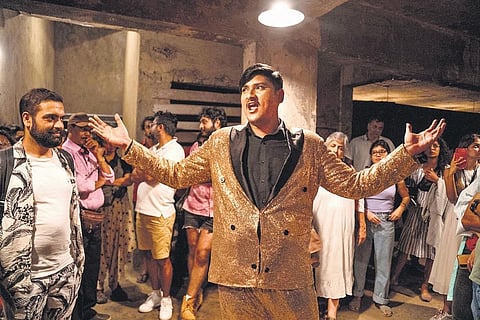

How does one manifest multitudes of expressions in a theatrical format? Stories of ambition, guilt, fear, desire, love, and community that reveal the complex nature of our contemporary society? Artist and director Amitesh Grover’s play 'The Money Opera' is one such experiment. First staged in Goa last year, it was performed in an abandoned factory in Okhla, Delhi, recently. “Once inside the venue, you find yourself in a dark and dreamlike universe that is continually breaking apart and falling away; it’s like a riddle that needs solving,” says Grover, whose work spans performance, video, digital art, text projects, installation and theatre.
Hidden in a relatively quiet street in the otherwise busy industrial area, the building is dilapidated. Peeling wall paint, cobwebs, and even layers of fungi and mould welcome the viewers. The various rooms spread over two floors are dimly lit and occupied by respective actors. Minimal yet effective props are used to support the act. The 90-minute presentation opens with the actors climbing a scaffolding surrounding the building, while a narrator sings a lament to the quest for money.
Inside, a mentally ill woman goes on about her unending trauma of life, while in another room, a domestic worker’s daughter dreams of becoming a lavani performer one day. Each character focuses on a unique circumstance and relationship with the idea of money. A capitalist (Jitu Rabha), an explorer (Ashish Ghosh), and a cleaner (Abhishek Kausahal), each narrate stories spanning across a mix of emotions.
The play is free-wheeling theatre, where audiences choose what they watch, how they watch, but are in little control of what occurs inside the building. It is presented in multiple languages—Hindi, English, Marathi, Konkoni, Kannada and Bhojpuri. Grover says the history of the building, architecture, age and memories all come to haunt the narrative. “The character of the landlord talks about the volition of the building and the many silent resistances it presents,” adds the director, who also created India’s first cyber-play The Last Poet, which debuted online in 2020. It is an interactive performance staged in a 3D generative world revolving around a missing poet.
As 'The Money Opera' travelled from Goa to Delhi, new characters entered the show, emerging from the social and political values of the city. What makes the performance particularly interesting is the mix of actors and people from real life chosen through an audition process. Stock-broker, scientist, ecological activist, cosmetologist, politician, mechanic, fortune-teller are at the centre of the theatre. Grover says they are the defining aspect of the show. The presence of real people alongside professional actors is a rare clash between fiction and reality that is simultaneously emotional and playful.
“In this show, you meet a young billionaire, ghost, inheritor, child goddess, thief, explorer and several others, who hammer at society’s facade and tell us about the extent to which they go to survive in, trump, or fight against the system,” says Grover, who worked closely with writer Sarah Mariam, as the scripting and conceptualising took place simultaneously. After a character’s draft was written, it was rehearsed with the actor to test its ‘believability’ and ‘strangeness’—both critical to the work.
Serendipity Arts Foundation collaborated with the Gujral Foundation for the Delhi edition of the play, and it was presented as part of the initiative, Beyond Serendipity. “With the campaign, we are expanding our horizons and bringing the festival closer to new audiences. Each city becomes a chapter in our story, where people from all walks of life can gather, engage and connect through the universal language of art,” says Smriti Rajgarhia, Director, Serendipity Arts Foundation and Festival. At the end of the day, it’s the ability to display a variety of emotions that makes 'The Money Opera' stand out.